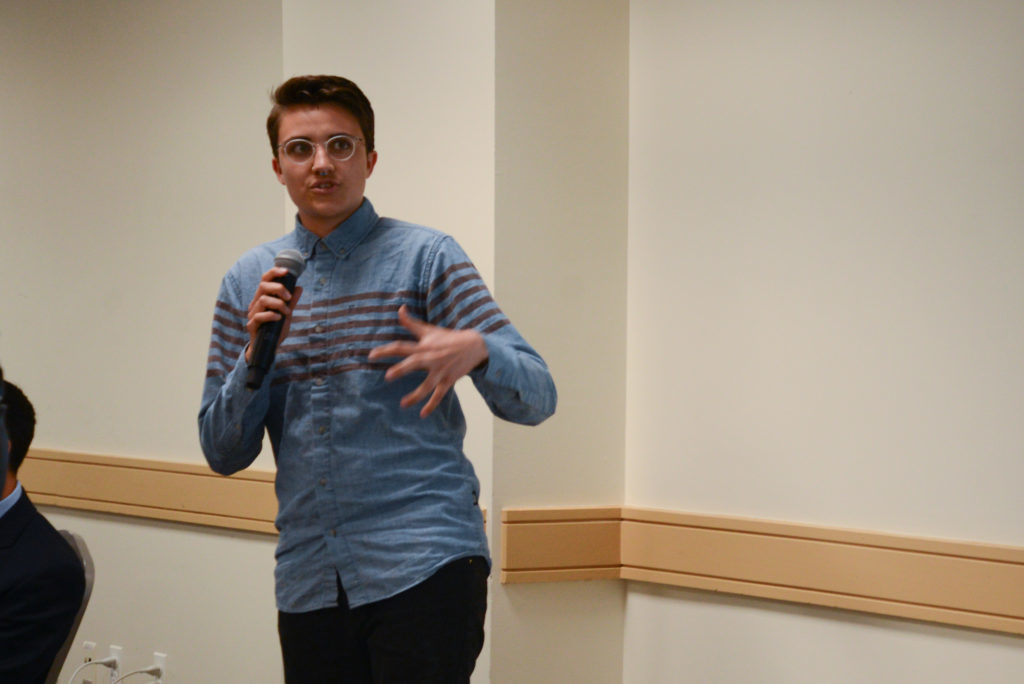Updated: April 17, 2017 at 1:10 p.m.
Transgender students can now choose what gender they identify with when they apply for housing.
The housing application for the 2017-2018 academic year allows students to select their gender from a list of options and enter a preferred name, Housing Director Seth Weinshel said. LGBTQ student leaders said the new option is a positive development for transgender students who may face uncomfortable or hostile living situations, especially in their freshman years.
“The added question to the application provides the University with additional information when making housing assignments and is becoming a best practice for college and university housing offices across the country in support of students within the LGBTQIA+ community,” Weinshel said in an email.
Weinshel said housing officials reevaluate the application questions each year and make adjustments based on feedback from students and staff. Weinshel declined to say what gender options students will be able to chose from on the application or if it will include non-binary genders.
The new option means transgender students can room with students who identify with the same gender they do. Before, students could apply for gender-neutral housing but otherwise would typically be placed with either all male or all female roommates.
Ciaran Lithgow, the Student Association’s director of sexual and gender identity policy, said the change is a step in the right direction for students who were uncomfortable in their living environments.
“It’s better than what it was before, where trans women were roomed with men – especially straight cis men – who had no clue how to interact with these women, who were constantly misgendered, constantly felt uncomfortable in the rooms and things like that,” Lithgow said.
The addition to the housing application comes after the SA released the results of a survey examining living situations for LGBTQ students at an SA Senate meeting earlier this month. The survey found that 21 percent of LGBTQ students have experienced homophobic or transphobic interactions with their roommates.
The survey, which was emailed to the student body in February, received 209 total responses, 177 from students who identified as LGBTQ. Results also showed that 36 percent of LGBTQ students were not comfortable being out to some or all of their roommates, and 13 percent said their freshman year housing situation created a “negative and unhealthy” living environment.
Lithgow, who helped create the survey, said it was a response to roommate “horror stories” they heard from LGBTQ students while serving as Allied in Pride’s president.
“Some of them were microaggressions, in that girls would express to their lesbian roommates that they were uncomfortable, like ‘oh, I don’t want to get undressed in front of you, because you’re going to undress me with your eyes,’” Lithgow said. “We want to be able to balance comfortability of individuals but also destigmatize sexuality and variations in sexuality.”
Lithgow said they approached Associate Dean of Students Tim Miller last semester with concerns, but Miller told them that they needed more “concrete” evidence to make changes. Lithgow then created the survey and brought it back to the Division of Student Affairs to get feedback.
“We look forward to talking to students about the results of the survey,” Miller said in an email.
Lithgow said the survey was specifically aimed at first-year students, because freshmen don’t usually choose their roommates, potentially forcing them into uncomfortable living situations.
Lithgow said they hope the survey results will urge administrators to ease uncomfortable housing situations for first-year students by creating an LGBTQ and ally-friendly living and learning community or asking students on the housing application if they would like to live with other LGBTQ students.
Lithgow said they plan to meet with housing officials later this week to discuss the survey’s results further.
Alex Root, the SA’s assistant director of sexual and gender identity policy, said the survey’s results didn’t surprise him. As a resident adviser, he said he has dealt with roommate conflicts over sexual orientation or gender identity.
“While a cisgender and/or straight person may be worried about fighting with their roommate over the temperature, an LGBTQIA+ student is worried because their fundamental identity may not be welcomed in their living space,” Root said in an email.
Root hopes the survey highlights LGBTQ students’ unique housing needs and that it will increase pressure on officials to address the discrimination some students face, he said.
“While I think that there are many feasible solutions, it will come down to the administrators to answer this question,” Root said. “The solution will depend on how dedicated they are to genuinely making changes, that sometimes may be difficult, in order to improve the housing process for LGBTQIA+ students.”
This post was updated to reflect the following correction:
The Hatchet incorrectly reported that the SA’s LGBTQ housing survey was distributed in March. The survey was sent out in February. We regret this error.





